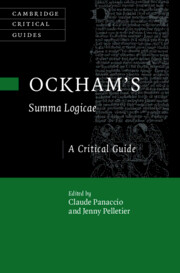Book contents
- Frontmatter
- Contents
- Contributors
- Abbreviations of Ockham’s Works
- Introduction
- Chapter 1 Metaphysical Methodology in Ockham’s Summa Logicae I
- Chapter 2 Ockham and Syncategoremata
- Chapter 3 Ockham on Metalanguage
- Chapter 4 Ockham’s Moderate Modism
- Chapter 5 Relations in Summa Logicae
- Chapter 6 The Threat of Pernicious Ambiguity
- Chapter 7 Ontology and Ockham’s Account of Truth Conditions for Tensed Propositions
- Chapter 8 Ockham’s Theory of the Categorical Syllogism
- Chapter 9 Ockham’s Modal Logic
- Chapter 10 Theory of Demonstration
- Chapter 11 The Obligationes of William of Ockham
- Chapter 12 Ockham on the Liar Paradox
- Chapter 13 Ockham on Figurative Discourse
- Bibliography
- Index
- Cambridge Critical Guides
Chapter 9 - Ockham’s Modal Logic
Published online by Cambridge University Press: 04 September 2025
- Frontmatter
- Contents
- Contributors
- Abbreviations of Ockham’s Works
- Introduction
- Chapter 1 Metaphysical Methodology in Ockham’s Summa Logicae I
- Chapter 2 Ockham and Syncategoremata
- Chapter 3 Ockham on Metalanguage
- Chapter 4 Ockham’s Moderate Modism
- Chapter 5 Relations in Summa Logicae
- Chapter 6 The Threat of Pernicious Ambiguity
- Chapter 7 Ontology and Ockham’s Account of Truth Conditions for Tensed Propositions
- Chapter 8 Ockham’s Theory of the Categorical Syllogism
- Chapter 9 Ockham’s Modal Logic
- Chapter 10 Theory of Demonstration
- Chapter 11 The Obligationes of William of Ockham
- Chapter 12 Ockham on the Liar Paradox
- Chapter 13 Ockham on Figurative Discourse
- Bibliography
- Index
- Cambridge Critical Guides
Summary
Inspired by the later medieval development in logic, especially theories on the properties of terms, Ockham’s modal logic is an innovative expansion of Aristotelian modal logic. Ockham’s treatment of modal logic is evolved systematically on the ground of the medieval distinction between two readings of modal propositions, that is, the reading in the divided and in the composite sense, which can be compared to the de re and de dicto reading in modern modal logic. The result is a comprehensive theory of propositional modal logic and syllogistics. In addition to Aristotle’s modal term logic, Ockham works out syntactic rules for inferences of modal sentences in the composite sense and offers a framework for propositional modal logic. In this chapter, I outline Ockham’s modal logic by describing the related texts, semantics for modalities, the linguistic and logical structure of modal sentences, their truth conditions, propositional modal logic, and modal syllogistics in Ockham.
Keywords
Information
- Type
- Chapter
- Information
- Ockham’s Summa LogicaeA Critical Guide, pp. 189 - 209Publisher: Cambridge University PressPrint publication year: 2025
